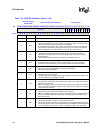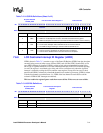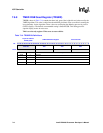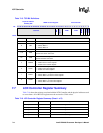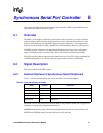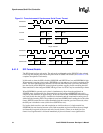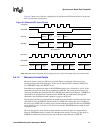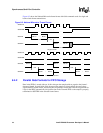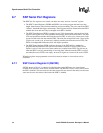
Intel® PXA255 Processor Developer’s Manual 8-1
Synchronous Serial Port Controller 8
This chapter describes the Synchronous Serial Port Controller’s (SSPC) signal definitions and
operation for the PXA255 processor usage.
8.1 Overview
The SSPC is a full-duplex synchronous serial interface and can connect to a variety of external
analog-to-digital (A/D) converters, audio and telecom codecs, and other devices that use serial
protocols for transferring data. The SSPC supports National’s Microwire* , Texas Instruments’
Synchronous Serial Protocol* (SSP), and Motorola’s Serial Peripheral Interface* (SPI) protocol.
The SSPC operates in master mode (the attached peripheral functions as a slave) and supports
serial bit rates from 7.2 KHz to 1.84 MHz. Serial data formats may range from 4 to 16 bits in
length. The SSPC provides 16 entries deep x 16 bits wide transmit and receive data FIFOs.
The FIFOs may be loaded or emptied by the Central Processor Unit (CPU) using programmed I/O,
or DMA burst transfers of 4 or 8 half-words per transfer while receiving or transmitting.
8.2 Signal Description
This section describes the SSPC signals.
8.2.1 External Interface to Synchronous Serial Peripherals
Table 8-1 lists the external signals that connect the SSP to an external peripheral.
SSPSCLK is the bit-rate clock driven from the SSPC to the peripheral. SSPSCLK is toggled only
when data is actively being transmitted and received.
SSPSFRM is the framing signal, indicating the beginning and the end of a serialized data word.
SSPTXD and SSPRXD are the Transmit and Receive serial data lines.
Table 8-1. External Interface to Codec
Name Direction Description
SSPSCLK Output Serial bit-rate clock
SSPSFRM Output Frame indicator
SSPTXD Output Transmit Data (serial data out)
SSPRXD Input Receive Data (serial data in)
SSPEXTCLK Input
External clock which can be selected to drive the serial clock
(SSPSCLK)




